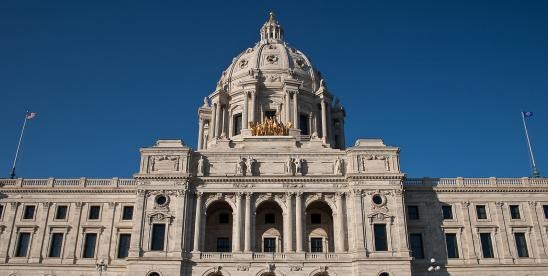Minnesota’s legislature was busy providing new rules and obligations for employers. In addition to the changes in the Minnesota Human Rights Act (MHRA), Earned Sick and Safe Time (ESST), Paid Family and Medical Leave, and pay transparency laws (which we discuss in separate articles), there were more amendments and additions employers should be aware of.
Below is a rundown of the major changes and amendments employers should understand.
Amendments to Pregnancy Accommodation and Pregnancy and Parental Leave Laws
The Minnesota legislature made slight adjustments to the state’s pregnancy accommodation law and the pregnancy and parental leave law that will go into effect Aug. 1, 2024. The amendments clarify that when an employee takes leave as a pregnancy accommodation or pursuant to Minnesota’s pregnancy and parental leave law, employers must maintain the employee’s coverage under any group insurance policy, group subscriber contract, or healthcare plan for the employee and any dependents as if the employee was still working. However, employers can continue requiring employees to pay their share of the premium for any such benefits. Additionally, employers may not count any time an employee takes off work to attend prenatal care medical appointments against the employee’s 12-week leave entitlement under the pregnancy and parental leave law.
Restrictive Covenant Law
On May 17, 2024, Governor Tim Walz signed legislation into law voiding non-compete and non-solicitation provisions in contracts between a company and its customers, whether the customer is an individual or a business. The law prohibits a company from barring a customer from hiring or soliciting an employee of the company. In addition to the prohibition, the law requires any company with existing agreements that violate the new law to provide notice to its employees of the new law and that its existing contract violates the new law.
The law does not apply to workers providing professional business consulting for computer software development and related services who are seeking employment through a third-party company with the knowledge and intention of being considered for a permanent position with the customer as their employer later.
The law takes effect on July 1, 2024, and applies to contracts entered into on or after that date. The law piggybacks on a law passed last year banning most non-compete agreements in employment contracts entered into on or after July 1, 2023.
Gratuities Law
On May 17, 2024, Governor Walz signed legislation amending Minnesota Statutes section 177.24, the law regarding shared gratuities. The amendment requires that any tips or gratuity received by credit card or other electronic payment be credited to an employee during the same pay period in which it was received by the employee. The amendment further requires that the same tip or gratuity be distributed in full to the employee no later than the next scheduled pay period from which it was received by the employee. This law takes effect Aug. 1, 2024.
Alternative Drug, Alcohol, and Cannabis Testing
The Minnesota legislature has provided employers an alternative method to conduct drug, alcohol, and cannabis testing on employees and applicants. Effective Aug. 1, 2024, employers may use “oral fluid testing” that does not require use of a testing laboratory. A sample of the individual’s saliva is collected and then tested for purposes of detecting drugs, alcohol, or cannabis. The testing used must be able to detect the presence of drugs, alcohol, or cannabis (or their metabolites) at levels “at or above the threshold detection levels” required for laboratory testing under Minnesota’s drug testing statute. The oral fluid testing alternative is simply an alternative and does not otherwise expand the scope of employee or applicant testing.
The legislature also provided procedures employers must follow when administering oral fluid testing. The law requires the individual undergoing testing be informed of the result at the time of testing. If the oral fluid test indicates a positive, inconclusive, or invalid result, the individual has 48 hours to request another drug, alcohol, or cannabis test be performed at a testing laboratory. The employer is responsible for any costs associated with the testing. If the individual fails the subsequent test, the individual may request a confirmatory retest and be responsible for any costs associated with it.
Oral fluid testing does not alter any other legal obligations employers have under Minnesota’s drug testing statute.
New Rules and Remedies Designed to Target Misclassification of Employees
Minnesota has strengthened its laws relating to the misclassification of employees in general, and in the construction industry specifically. For non-construction employers, damages and penalties available that can be imposed for the misclassification of a worker as an independent contractor include: (1) compensatory damages to the individual wrongly classified, which can include: the value of supplemental pay including minimum wage, overtime, shift differentials; vacation and sick pay and other forms of paid time off; health insurance; life and disability insurance; retirement and related savings plans; social security and Medicare; and any other cost and expense incurred by the individuals resulting from the improper classification; (2) a penalty of up to $10,000 for each individual wrongly classified or related violations of the statute; (3) a penalty of $1,000 for any delay, obstruction, or failure to cooperate in an investigation by the commissioner (each day of delay, obstruction, or failure to cooperate constitutes a separate violation). This law goes into effect on July 1, 2024. Separate provisions specifically targeting the construction industry and misclassification will also go into effect on July 1, 2024.
Finally, based on Minnesota’s policy to prevent employers from misclassifying workers, the Minnesota legislature passed the “Intergovernmental Misclassification Enforcement and Education Partnership Act.” The Act is designed to allow several governmental entities, with separate jurisdiction over employee misclassification in Minnesota, to coordinate, collaborate, and share information with the governmental entities to ensure appropriate investigation and strategic enforcement of the misclassification laws. These governmental entities include: the Department of Labor and Industry; the Department of Revenue; the Department of Employment and Economic Development; the Department of Commerce; and the Attorney General in its enforcement capacity.
Increases to Powers of Department of Labor and Industry
The Minnesota legislature also made some significant changes to the Minnesota Department of Labor and Industry’s (MN DLI’s) powers in investigating and remedying complaints. Effective immediately, these include:
- The definition of “private data” has changed from being only data that would identify employees who have filed complaints with MN DLI against an employer to including data that would identify any person who has filed such a complaint.
- The Department can share “private data” with other government entities so long as the complainant provides MN DLI written consent. In other words, if MN DLI identifies a potential issue outside the scope of its authority, it can pass that information along to the proper agency for review and handling.
- MN DLI’s ability to request documentations and information has been expanded so that it may make requests to “persons” as opposed to just the employer itself.
- In terms of remedying violations, MN DLI has the authority to order reinstatement of discharged employees and to order “any other appropriate relief.” There are no guidelines or examples given as to what “appropriate relief” would include.
As a result, employers should expect significant changes in how MN DLI conducts investigations and how it attempts to remedy any violations it finds.






 i
i


